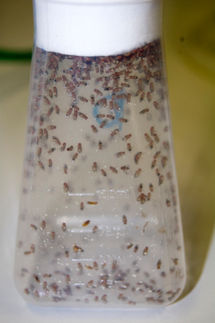Lurking lung cancer alleles
Researchers identify common sequence differences in human DNA that confer genetic susceptibility
In the largest genome-wide scan for lung cancer-susceptibility genes to date, scientists from The Institute of Cancer Research have identified 64 gene variants that may predispose some individuals to lung cancer. These genetic variants are known as "low-penetrance alleles" because they only occasionally stimulate tumor development. The study, which appears in Genome Research, will eventually help researchers to pinpoint the various genetic and environmental causes of lung cancer.
Lung cancer is predominantly caused by a single environmental factor: tobacco smoke. Studies have shown that long-term cigarette smokers have a 10-fold increased risk of acquiring lung cancer when compared to non-smokers. But in recent years, scientists have accumulated evidence that hereditary factors also contribute to lung cancer susceptibility. For example, a higher prevalence of the disease has been observed in patients with Bloom's and Werner's syndromes, who have inherited mutations in specific genes that are involved in DNA replication, recombination, and repair.
"Our research suggests that it is highly unlikely that only one or two genes are primarily responsible for the genetic basis of lung cancer," explains Dr. Richard Houlston from The Institute of Cancer Research and Cancer Research UK, who co-led the study with Dr. Tim Eisen from The Institute of Cancer Research and The Royal Marsden NHS Foundation Trust. "The exact nature of lung cancer susceptibility is probably much more complex. We hypothesized that most of the inherited genetic risk is posed by sequence changes in the genome that augment the effects of exposure to cigarette smoke."
As part of the U.K.-based Genetic Lung Cancer Predisposition Study (GELCAPS), the researchers tested DNA samples from 2707 healthy individuals and 1529 lung cancer patients. In each of these samples, they evaluated a total 1476 DNA variants known as single nucleotide polymorphisms (SNPs) in 871 genes with a presumptive role in cancer biology. In total, 64 of the SNPs were found to be associated with lung cancer development. Several of these SNPs alter the structure or function of an expressed protein, so it is possible that they are directly responsible for the observed association. Additional research will be required to understand the exact role that each of these genetic variants plays in increasing one's risk of lung cancer.
Other news from the department science

Get the life science industry in your inbox
By submitting this form you agree that LUMITOS AG will send you the newsletter(s) selected above by email. Your data will not be passed on to third parties. Your data will be stored and processed in accordance with our data protection regulations. LUMITOS may contact you by email for the purpose of advertising or market and opinion surveys. You can revoke your consent at any time without giving reasons to LUMITOS AG, Ernst-Augustin-Str. 2, 12489 Berlin, Germany or by e-mail at revoke@lumitos.com with effect for the future. In addition, each email contains a link to unsubscribe from the corresponding newsletter.




















































